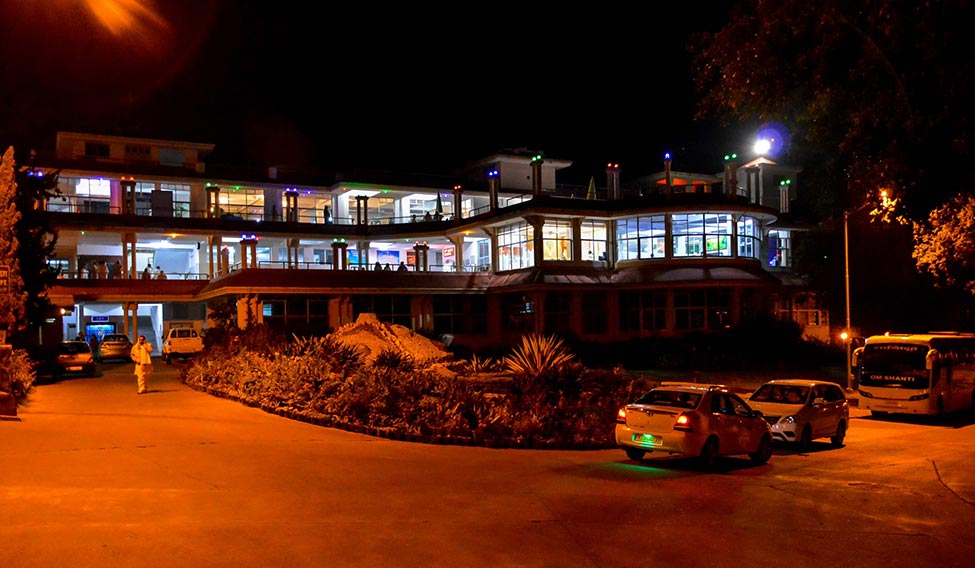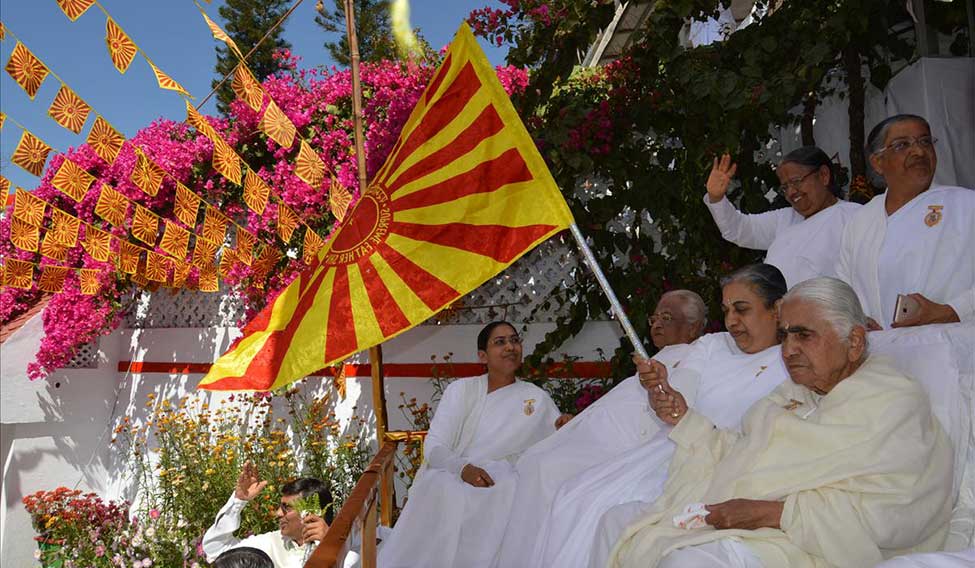In a patch of shade in the 25-acre Gyan Sarovar complex of Brahma Kumaris in Mount Abu, Rajasthan, two brothers of the organisation were engaged in a heated discussion.
A snatch of it I overheard: “The concept of Advaita philosophy is fundamentally wrong. If God is in everything, is He present in a criminal, a murderer? No. The Almighty is omnipotent, not omnipresent. That is the difference.”
A stone’s throw away, in the nearby Harmony Hall, the administrative director of the All India Council of Technical Education, Dr Manpreet Singh Manna, was decrying, to an attentive audience, the failure of educational institutions in instilling values in the youth.
Halfway through his speech, a hush fell in the hall. Helped by multiple assistants, a wheelchair was lifted onto the podium.
An old lady in white waved at the audience, eliciting cheers of delight. It was Dadi Janki, the spiritual head of Brahma Kumaris.
Everyone in my immediate vicinity had a favourite Dadi story to tell.
“She is 102 years old. But scientists across the spectrum have confirmed, after extensive tests, that she has the most stable mind in the world.”
“She flies to London at least three times a year and engages classes. Even at this age, she is indefatigable.”
“Dadi Janki and Dadi Gulzar [the second-in-command] communicate almost as if by telepathy.”
“If the feeling of love ever takes a human form, it will be Dadi Janki.”
The founder of Brahma Kumaris, Dada Lekhraj, was a diamond merchant born in 1876. He reportedly received the vision of the four-armed Vishnu, during a quest for spiritual freedom. He organised spiritual gatherings under the banner of Om Mandali, extolling virtues of celibacy and a sattvic lifestyle.
The Brahma Kumaris, clad in white, call each other brother or sister. They eat only vegetarian food cooked by themselves or a fellow brother or sister. For them, Raja Yoga, which purifies the mind, is the way to purify a world of decaying moral values.
They are waiting for a golden age. They believe in a life cycle of 5,000 years divided into four yugas. They say a combination of religious strife, clash between superpowers and environmental calamity would result in the destruction of the world (one brother said, by 2036). A golden age would then arrive. An age in which the vibrations will be pure; a world where the cow and the lion will drink from the same fount, and children will be born with a smile.
Brahma Kumaris elevated women to a high status in the organisation, a revolutionary step in the early 20th century. This new-found empowerment and their vows of celibacy so angered their husbands that an anti-Om Mandali campaign came up. Multiple cases were filed against Brahma Kumaris, and physical attacks were mounted, forcing the organisation to relocate to Karachi in 1938.
Not long after partition, Brahma Kumaris moved to Mount Abu. Starting off with a three-acre property called Madhuban, it now owns more than 45 acres in Mount Abu and around 150 acres in Abu Road, about 25km away. It has footprint in 130 countries, 9,000 centres and a television channel. Its Spiritual Application Research Centre conducts research on topics like the practical effects of spiritual healing. Women head almost all departments in the organisation.
 Night lights: Gyan Sarovar complex in Mount Abu | Brahma Kumaris
Night lights: Gyan Sarovar complex in Mount Abu | Brahma Kumaris
The Brahma Kumaris are involved in a plethora of socio-spiritual services, including de-addiction, self-empowerment and environmental awareness. They had led relief work during natural disasters like the Gujarat earthquake and the tsunami in Tamil Nadu. In several American cities, they conduct retreats and courses in Raja Yoga meditation.
Shantivan in Abu Road is the international headquarters of Brahma Kumaris World Spiritual University. It has meditation halls, hospitals and extensive residential quarters. “We hold regular training sessions in the diamond hall. Training, accommodation and food are provided free of cost. Our only requirement is that the applicants produce a letter of recommendation from a local branch of Brahma Kumaris,” said brother Rajan, who took me to a hall that could seat 25,000 people. “You can plug in your earphones and listen to live translations of the lessons—in whichever language you are comfortable with.”
The many meditation halls throughout the complex were strangely illuminated in a peculiar shade of pink. What was even stranger, people meditated with their eyes open. Why? “We are karma yogis. We indulge in different activities throughout the day. Even while engaged, we have to learn to maintain the yoga, the connection; shift ourselves from a state of body-consciousness to soul-consciousness. It helps us build a connection with the Almighty,” said brother Kannan. Meditating at the crack of dawn, from 4am to 4:45am, is compulsory for all Brahma Kumaris.
In the crowd, one of the sisters stood out. A young Mumbaikar. How did she, a millennial like me and many others who would swoon at the very thought of abstinence, take to the strict discipline of Brahma Kumaris? “At first I found it very difficult, too,” said Preeti Mulani, 30, who left her last job as secretary to the CEO of a company to join the organisation full-time. “I had finished my accountancy degree and was working for a corporate company when I started this meditation course. It was a seven-day course, with lessons on Raja Yoga, godly knowledge, imbibing divine qualities and godly service. I have had many spiritual experiences. Once, I fell from a train onto the platform. Everything, including my phone, was damaged. I, however, did not suffer any internal or external injuries, neither did the Murli [directions for a virtuous living] that I was holding in my hand.”
Usha Didi is a troubleshooter who injects spirituality into management training for corporates. “We deal with self-management and spiritual thinking. What we find is that, on many occasions, ego comes into play when others refuse to conform to a pre-conceived image that you have of yourself. We help them in self-analysis,” she said.
Charred landscape had marred the road to Mount Abu, winding and drearily beautiful. The hill station in the Aravalli ranges derives its name from the mythical serpent Arbuda, who saved Lord Shiva’s bull, Nandi, from a chasm. “After the monsoon, flowers blossom in the hills—a brilliant plumage reminiscent of Kashmir,” my ‘brother’ guide said. “In ancient days, there was an unwritten rule that enemies should refrain from taking up arms here, respecting the sanctity of the hills.”
It was in these mountain ranges that, in 2007, Pratibha Patil received the news of her nomination as president of India. She had then credited Brahma Kumaris, saying the divine spirit had predicted a huge responsibility for her.
“Do political leaders usually come here?” I asked the brother.
“All of them do. Just recently, L.K. Advani had arrived to pay his respects.”
The irony was so rich that it could practically be mined from the hills. I looked around, half-expecting to see Advani sharing a glass of buttermilk with Sharad Yadav.













